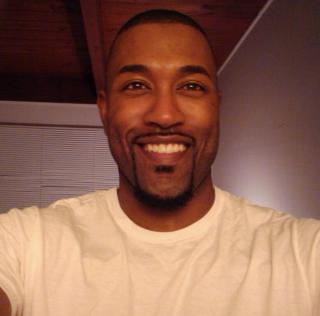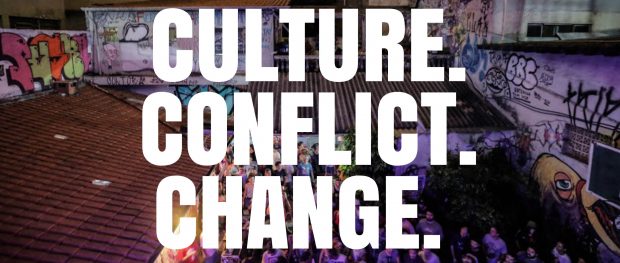Jason Nichols: Debunking “old tropes” through hip hop

Some say you can trace the origins of hip hop to a single room in New York City on 11 August 1973. At 1520 Sedgwick Avenue in the Bronx, the Jamaican-American DJ Kool Herc threw a party and, playing percussive funk on his speakers, noticed that the crowd danced most vigorously during the instrumental break. He then used two turntables and copies of the same song to keep the break going, while talking — or MCing — over it to engage the crowd.
By that time in the early 1970s, the historically middle-class Bronx was transforming. For decades it had been home to upwardly mobile black and latino families, and the borough was the most integrated community in the United States. That was until the accelerated post-war flight of white residents for the suburbs, falling house prices and the loss of so many manufacturing jobs, coupled with tens of thousands of mostly poor immigrants moving in.
Coming out of these conditions, hip hop has always been about inspiring the disenfranchised to overcome their obstacles.
Jason Nichols, aka Haysoos, is a hip-hop artist, professor and editor-in-chief of Words, Beats and Life, the first peer-reviewed academic journal of global hip-hop culture. He has been rapping since he was a pre-teen in the early 1990s when he first heard My Philosophy by Boogie Down Productions, a hip-hop group from the South Bronx.
“I remember seeing the video and hearing that acapella part, and deciding I want to try it,” Nichols tells Index on Censorship. “It really showed me that rap music and MCing was a platform to be heard, and everything in my life since has revolved around that, from expressing your opinions about the world and thinking ‘how can we make things better?’”
When people think of hip-hop culture, rapping, DJing, graffiti and breakdancing are all things that come to mind. “However, I always say that hip-hop academics is another element of the movement,” says Nichols, who is a lecturer at the African American Studies Department of the University of Maryland, where his interests include black masculinity, hip hop and dance, and black and latino identities and relations.
Media attention and commercial rap music have given hip hop an image problem. The genre is heavily associated with guns, gangs and prison culture. As many poor neighbourhoods of colour became further devastated in the 1980s or 1990s, hyper-masculinity became, for many, entangled with race or class. As Nichols explains: “It was, and still is, a matter of control and mastery of your environment.”
One of the main reason young black men identify so much with their neighbourhood, their block or the building they come from is because they are saying “this is mine”, Nichols explains. “They know their spatial freedom is contained and confined and that they world isn’t theirs, but this particular space is,” he adds.
In his lectures on masculinity, Nichols looks as people like Moms Mabley, the lesbian comedian who employed masculine forms of black humour and Amiri Baraka, the poet, author, essayist and critic, who wrote about masculinity and heterosexuality as representative of black nationalism in the United States. Nichols brings his analysis up to the modern day by looking at artists like Kehinde Wiley, whose paintings explore black images of masculinity.
“Whether male or female, every person expresses several different masculinities throughout the day, and in my class, we talk a lot about those being expressed through art,” explains Nichols. “And, of course, all these directions led to hip hop.”
However, he believes we need a deeper understanding of hip hop because the idea of “hyper-masculinity” in itself is “problematic”. “It goes back to the old tropes about black men, in general, being supposedly violent or hyper-sexual,” he adds.
As long as certain expectations of race persist, the perception of masculinity will always be more of a problem for black or latino men. “Look at a white rapper like Eminem, who, as Greg Tate wrote, had everything but the burden,” explains Nichol.
“Eminem can be angry, masculine and all that, while also being allowed to be vulnerable in a way black men are not. He has the freedom to talk about his mother and his troubled family life in a way men of colour don’t have room to do.”
Taking the example of Tyler the Creator, the black American rapper who was banned from entering the UK based on his lyrical content, we have to ask, would this have happened to someone like Eminem, who is just as offensive but happens to be white? “We have to recognise the privileges white artists have over black artists,” explains Nichols. “The thing we always hear about when Eminem says something is his right to free speech.”
Looking at Washington DC, where Nichols spends much of his time, hip hop – while deeply entrenched in the mainstream — still makes up one of the last truly underground music movements in the United States. A hardcore punk scene sprang up in the capital in 1979 and continued to grow a following into the 1980s and 1990s. DC’s rap scene came along a little while later, but the difference between both movements is that hip hop is still around.
“This is because black kids still face hardship in a way white kids don’t, and all of those punk guys, while still legendary, could much more easily be co-opted into the system,” says Nichols. “They can put on a suit and go to work, but for hip-hop artists, it’s been a little different.”
The DC metro area has seen a boom in development over the last decade, but that prosperity never made it across the river and one-quarter of the city’s black population is still living in poverty. While these conditions continue to exist, hip hop will be the outlet of choice for so many men of colour who feel they don’t have a voice.
“There’s also been a real concerted effort by the system to shut the city’s underground culture down,” explains Nichols, referring to the shutting how of venues. “But the strength of hip hop is that it is so broad that it’s almost impossible to do that.”
Also read:
– Poetic Pilgrimage: Hip hop has the capacity to “galvanise the masses”
– Colombian rapper Shhorai: “Can you imagine a society in which women have no voice?”
– Zambezi News: Satire leaves “a lot of ruffled feathers in its wake”
8-9 July: The power of hip hop
A conference followed by a day of performance to consider hip hop’s role in revolutionary social, political and economic movements across the world.

